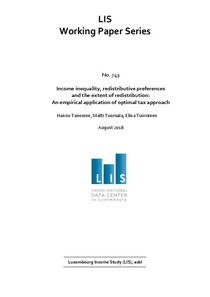Income inequality, redistributive preferences and the extent of redistribution: an empirical application of optimal tax approach
"We examine empirically the relationship between the extent of redistribution and the components of the Mirrlees framework, with a focus on inherent inequality and government’s redistributive preferences. We have constructed our income distribution variables from the Luxembourg Income Study (LI...
| Main Authors: | , , |
|---|---|
| Institution: | ETUI-European Trade Union Institute |
| Format: | TEXT |
| Language: | English |
| Published: |
Luxembourg
2018
LIS |
| Subjects: | |
| Online Access: | https://www.labourline.org/KENTIKA-19303320124911215029-income-inequality,-redistribut.htm |
| Summary: | "We examine empirically the relationship between the extent of redistribution and the components of the Mirrlees framework, with a focus on inherent inequality and government’s redistributive preferences. We have constructed our income distribution variables from the Luxembourg Income Study (LIS) database, which provides information on both factor and disposable incomes. Our redistributive preference measure is constructed using the optimal tax formula for which we have collected data from various sources. In addition to traditional linear specifications, we use flexible methods to allow nonlinearities because pre-specified functional forms are not easy to justify in empirical investigations of the optimal tax framework. We study 14 advanced countries for approximately four decades and find support for the Mirrlees model: There is a positive relationship between factor-income inequality and the extent of redistribution. We also find a link between our redistributive-preference measure and the extent of redistribution." |
|---|---|
| Physical Description: | 26 p. Digital |

